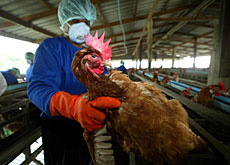Expert says Europe would struggle against bird flu

A Swiss expert on epidemics has warned that an outbreak of avian flu in Europe would be difficult to contain, despite contingency plans to deal with the deadly virus.
Robert Steffen, head of Switzerland’s pandemic prevention plan, says the effects in western Europe would be catastrophic if the virus were to combine with human influenza.
The bird flu epidemic has affected ten countries in Asia over the past few weeks. At least ten people, most of them children, have died after coming into close contact with infected birds.
Governments have introduced measures to curb the spread of the disease, slaughtering millions of chickens in the process.
Regional health ministers have also held meetings with international experts to try to come up with ways of stopping the epidemic.
The biggest fear is that the virus, which struck once before in Hong Kong in 1997, could merge with the common human influenza virus. It would then be able to spread easily from human to human, and most people would be defenceless against it.
An attack by this mutant virus could, according to the World Health Organization, result in an epidemic comparable with last year’s Sars outbreak.
Stopping the spread
Steffen, who is also a professor at Zurich University’s Institute for Social and Preventive Medicine, warns that the virus could prove difficult to contain.
“Hypothetically, if it becomes like common flu, it is very likely the epidemic would involve Switzerland as it would the rest of the world,” he told swissinfo. “That would be an absolutely dramatic situation.”
Steffen says it is vital to stop the spread of bird flu in Asia. “Otherwise, it would just be an illusion to believe we can keep Europe free of the virus,” he added.
In Switzerland, the authorities are closely monitoring the situation in Asia to decide what, if any, measures need to be taken. The Federal Health Office reiterated on Thursday that the Swiss population was in no danger at present.
Still, the Federal Veterinary Office last week banned imports of poultry and poultry products from Thailand and China, although there is no indication that people can catch the virus from eating infected meat.
Should the situation warrant it, Steffen says that guidelines are already in place for containing the virus.
“First, we would decide who does what, then we inform the public, and if necessary, we can ban large gatherings of people,” he said.
No vaccine
The biggest problem facing health authorities is the lack of a vaccine to fight the spread of bird flu.
According to specialists, the virus has mutated and vaccines cannot be prepared until the latest strain is properly identified.
A number of laboratories around the world are already tackling the latest version of bird flu. However, Steffen says a vaccine is still months away.
The Swiss health expert hopes that in the meantime other flu drugs may be enough to fend off any virus.
He points to regular flu treatments that are already on the market as one way of fighting off viral infection and pins his hopes on a new class of pharmaceuticals known as neuraminidase inhibitors.
These inhibitors attack the virus and reduce its capacity to infect. But Steffen warns that there are limited stocks, which creates additional headaches.
“You have to decide how to distribute the stocks you have and then just who gets it [the inhibitor] first,” he told swissinfo.
swissinfo, Scott Capper
The bird flu epidemic has spread to ten Asian nations, including Thailand, China, and Vietnam.
At least ten people, most of them children, are believed to have died after catching avian influenza from infected birds.
Switzerland banned poultry imports from China and Thailand last week although there is no known risk of contamination from eating the meat.
China has denied allegations that the current outbreak surfaced early last year but was covered up by the authorities in Peking.
There is currently no vaccine for the latest strain of bird flu.

In compliance with the JTI standards
More: SWI swissinfo.ch certified by the Journalism Trust Initiative



You can find an overview of ongoing debates with our journalists here. Please join us!
If you want to start a conversation about a topic raised in this article or want to report factual errors, email us at english@swissinfo.ch.